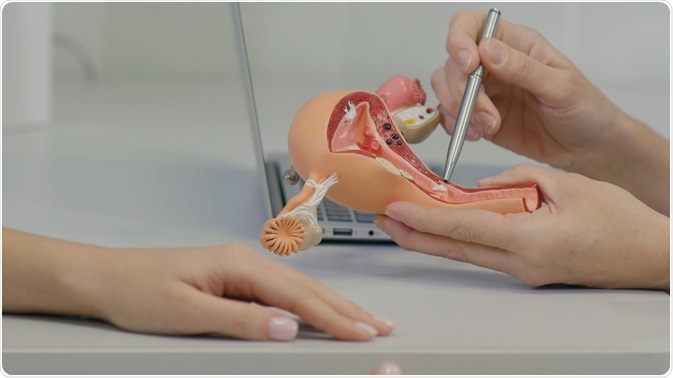A hysterectomy is a major procedure in which a woman’s uterus is removed from the pelvis. This procedure has both physical and emotional side-effects, some of which are detailed below.

Image Credit: Fancy Studio / Shutterstock.com
Menopause
Following a hysterectomy in which the ovaries are retained, the woman can expect to enter menopause within approximately five years. This early arrival of menopause is due to a disturbance in the blood supply to the ovaries that occurs at varying degrees as a result of the procedure.
When the ovaries are removed with the uterus, the woman will experience the onset of menopause immediately afterward, since the normal ovarian function of producing female reproductive hormones has been eliminated.
Taken together, this type of early menopause that is due to the hysterectomy procedure is otherwise known as surgical menopause. Some of the primary symptoms of surgical menopause include:
- Hot flushes
- Sweating
- Vaginal dryness
- Disturbed sleep
If the woman who has undergone the hysterectomy is below the age of 40, she has entered premature menopause. Premature menopause can increase the woman's risk of osteoporosis, Alzheimer’s disease, and heart disease as a result of the loss of the protective hormone estrogen.
In cases of premature menopause, the treating clinician may prescribe estrogen replacement therapy to alleviate the symptoms or alternative medications to prevent osteoporosis. The presence of certain coexisting medical conditions can determine which therapy is used in these cases. For example, if the woman has a history of liver disease or breast cancer, or has a strong family history of either of these conditions, hormone replacement may not be the best option.
Reduced sexual drive
Since women differ, it is not possible to predict the effect of a hysterectomy on the sexual drive of each individual woman. However, many women report increased enjoyment of sex after a hysterectomy, especially if the operation was done to relieve major bleeding or as a treatment for painful conditions of the uterus. Women who have had as many children as they desire may enjoy the freedom that comes with knowing that they can no longer become pregnant.
However, some women complain of losing interest or enjoyment during intercourse following a hysterectomy, perhaps because the uterine contractions have been lost or there is reduced cervical pressure. Vaginal dryness further complicates the problem, which can make penetration uncomfortable.
In most women, the loss of pleasure is temporary. The use of lubricant gels or hormone replacement therapy may increase their comfort level. Additionally, having an understanding partner is also important for women working through these post-surgical problems.
Hysterectomy (Uterus Removal Surgery): Side Effects,Purpose, Recovery | Yashoda Hospitals
Depression
Some women might feel depressed at the thought that they have lost their uterus or that they are incapable of bearing children. Others might resent the loss of their monthly periods. Regardless of the route of the problem, a hysterectomy may precipitate depression of varying degrees.
Depressive symptoms may include a feeling of loss or of a permanent change in their perceptions of femininity or fertility, the feeling of sadness, a loss of interest in things that they enjoyed previously, and a lack of energy. These symptoms may last for many weeks or months after the surgery. Counseling, whether by a friend, doctor, or support group, can be helpful in this type of situation.
In most women, these depressive symptoms are temporary. Talking to someone who has come through a hysterectomy successfully is often helpful in preparing for the side effects.
Bowel disturbances
After a hysterectomy, some women may complain of constipation. This is usually temporary and may be prevented by increasing the amount of fiber and fruit in the diet. At first, a laxative may be helpful in order to avoid straining when defecating, which might slow down healing. Gentle abdominal pressure may also help to evacuate the bowels more easily in some cases.
Vaginal discharge
A moderate amount of vaginal discharge that is less than what occurs during a monthly period is normal for up to six weeks. However, some women may report heavy bleeding, passing clots, or having a strong-smelling discharge. These may indicate complications of some kind and should be reported to the treating clinician immediately.
Long-term health effects
The loss of ovarian function is most sudden if the ovaries are removed along with the uterus. However, even in cases where the ovaries are not removed, the blood supply to these organs is interrupted by the surgery, leading to their eventual failure to produce female hormones.
The failure to produce these hormones may increase the woman’s risk of bone loss, ischemic heart disease, and/or urinary incontinence. Incontinence is usually temporary and may be averted by regular pelvic floor exercises, which the medical team should advise before the patient is discharged. In cases of incontinence, urinary infections should be avoided by drinking plenty of water.
References
Further Reading
Last Updated: Mar 17, 2021